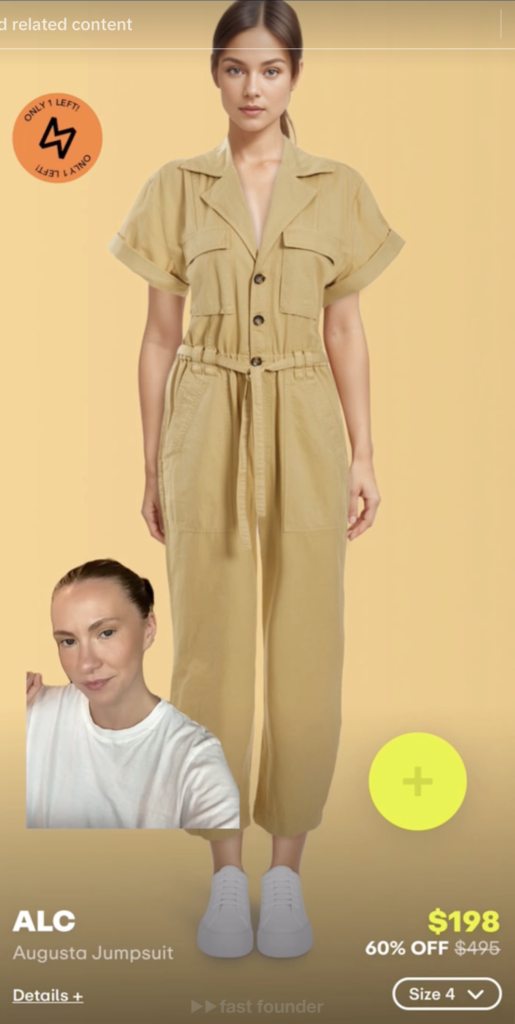Is he an idiot or a genius — the seller who claims: ‘Either you buy this item within 30 minutes, or you’ll never see it again!’? Here’s a startup that brilliantly kills two birds with one stone in this way 😉 Firstly, it addresses a problem worth 500 billion dollars. Secondly, it cultivates a habit among users to open their app every day. Everything seems simple, but there are nuances.
THE ESSENCE OF THE PROJECT

Yaysay hopes that with their help, “shopping will become a much more fun activity than before.”

And not just fun, but also profitable. That’s because in their app, users can buy designer items with huge discounts ranging from 20% to 70%.
The app itself is a feed of offers, which the platform’s AI tailors for each user individually, analyzing their preferences as they scroll through the feed and react to the displayed items.
Every day, a user can see a limited number of offers, but they change daily.
The clear goal set out by the startup founders in one of the interviews is to instill the habit in people to spend 5 minutes every day to open Yaysay and see if there’s anything new and astonishing at such a great price that it’s irresistible not to buy.

“5 minutes” is just enough time to view the limited number of offers for the day, specially curated for a specific user. “Every day” because tomorrow, the same offers won’t appear in the user’s feed.
Yaysay only puts up for sale limited batches of items, for which they’ve negotiated the biggest possible discounts with the suppliers. Hence, the items displayed today will surely be bought by someone who took the effort to open the app. So, the startup doesn’t need to keep pushing the same items to a user, hoping they’d finally buy something.
While scrolling the feed, users can set aside items they like by swiping them aside to decide on a purchase later. But once someone has set an item aside, they only have 30 minutes to make the purchase. If they don’t decide within 30 minutes, the set-aside item will permanently disappear from their cart and feed. The startup is currently experimenting with the right duration for this period, and it may vary for different categories of items.
Thus, the startup’s motto could be phrased as “Now or Never.” This could not only instill the habit of opening Yaysay every day but also the habit of making quick purchase decisions, which should undoubtedly increase the daily purchases through the app.
what interesting
Investors believe in this too, as they’ve recently granted Yaysay a new investment of $8 million when the startup just released the beta version of their app for iPhones in the App Store. Previously, Yaysay managed to attract the first $2.3 million in investments even before this.
What’s interesting
One of the founders of Yaysay, Philipp Krim, was a co-founder of the once highly hyped startup Casper, which managed to become a billion-dollar company by selling mattresses. Admittedly, it later deflated in its popularity, but that’s a different story.
“I started working on Yaysay after I realized that discounted sales represent a huge market,” says Krim. “Besides, finding and buying a great item at a fantastic discount in an offline store is fun. But no one has managed to transfer the same joy online yet.” It seems he hopes that Yaysay will achieve this.
Indeed, there are stores and entire retail chains specializing in selling discounted items. But “discounted sales—a huge market”?

It turns out that the off-price market, or discounted sales, is indeed a massive market that is projected to grow to $560 billion globally by 2030.

Moreover, it’s been growing confidently in recent years, as seen in the aforementioned chart. The numbers might slightly differ, but the magnitude remains consistent, making the trend line seem accurate. Between 2020 and 2028, the size of this market is expected to nearly double!

The most popular categories of discounted items include clothing, footwear, home goods, electronics, appliances, cosmetics, perfumes, and other personal care items.

Interestingly, these categories align well with items that typically overstock in sellers’ warehouses. For instance, out of the clothing stocked in warehouses, sellers manage to sell only 68.7% within a year, for perfumes it’s 62.8%, and for cosmetics, it’s even lower at 47.8%.

In terms of value, at any given moment, there are goods worth $500 billion sitting in sellers’ warehouses that they desperately need to sell—but can’t, even over the course of a year.
The most reliable way to clear out stock is by offering discounts. However, many brands and retailers avoid this in their stores because it tends to spoil their regular customers. So, they dispose of their unsold inventory through B2B channels – to specialized stores that primarily sell discounted goods, wholesalers, or distributors in other countries.
Recently, specialized B2B platforms have emerged for this purpose:
Ghost – raised 68 million dollars in funding.
Max Retail- raised 5.8 million dollars.
Yaysay essentially entered the same market for selling discounted inventory, but only through the B2C model, offering these goods to retail customers on a “now or never” basis.

A similar model, but in a completely different field, is used by the startup Moveable Feast.
They’ve created a service for delivering semi-prepared meals from popular American restaurants, where reservations often need to be made months, or even half a year, in advance. Each month they offer food from a new restaurant, and old offers permanently disappear from the service.

A subscription for such meals, each time from a new restaurant, once a month for a year, costs a substantial 3,960 dollars.
Additionally, Yaysay insists that they are pioneers of “discovery-based shopping” online – when a person stumbles upon something unexpected, something they weren’t specifically looking for, but ends up purchasing anyway. This is the exact opposite of “search-based shopping” – where a person looks for a specific item at the best price across various stores or marketplaces.
Search-based shopping is what people usually do online. Discovery-based shopping is more a privilege of offline shopping, where we casually window shop without any pressing need to buy something specific but occasionally purchase something that catches our eye. Although popular live shopping broadcasts by bloggers in China are phenomena of the same kind.
Yaysay wants to bring the habit of making unexpected purchases online, amplifying it in four ways:
Offer such rare items and/or give such rare discounts that a person can’t find anything similar anywhere else. Use AI to select products for each potential customer that they would most likely want to buy unexpectedly. Give a person a limited set of options each time, making it easier for them to choose. Cultivate a habit of regular shopping and quick purchases – by not repeating offers and limiting the decision-making time for a purchase. Where to Go “Now or never” is a cool mechanism that can be applied in many contexts. In the previous review about Moveable Feast, I mentioned a somewhat humorous example of converting Fast Founder to this model – where new reviews would disappear after 24 hours. Infrequent readers might drop off, but it would motivate everyone else to read the reviews regularly – leading to a habit that would be hard to break later. And access to the full archive could then be monetized 😉
So, the first direction for potential action is to consider whether you can use the “now or never” mechanic in your market or product.
However, the beauty of Yaysay is that it started applying this mechanism to address the massive problem of stockpiling goods in warehouses, aiming to take a rightful place in the already large and growing discount sales market.
So, the second potential direction is away from the market for stockpiled goods. And other models can be applied here – for instance, today’s mentioned B2B schemes of Ghost and MaxRetail.
In short, either look for a big market for the “now or never” model or use other methods to solve the problem of long stock turnaround. Or do both simultaneously – creating something like Yaysay 😉
About the Company
Yaysay Website: shopyaysay.com
Latest funding round: $8M, 27.09.2023
Total investments: $10.3M, rounds: 2.
